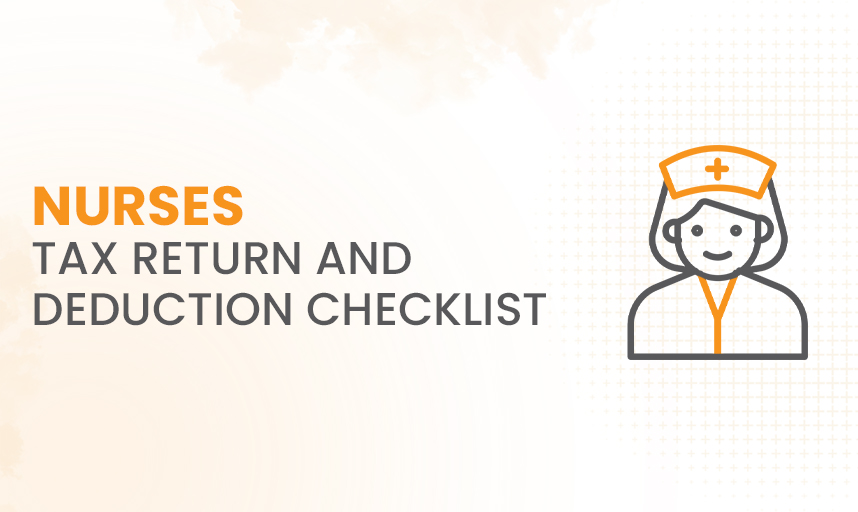As a nurse, midwife, or carer, dedicating your days to caring for others is no small doing. When tax season arrives, ensuring your finances are in order is crucial.
Tax season might not be the most exciting time, but for nurses, it can offer a chance to reclaim a portion of your hard-earned income through eligible deductions.
This blog offers you in-depth specifics, simplifying easy understanding and maximising your potential refund.
Three Keys to Boost Nurse Tax Deductions
Tax time can be tough, but for nurses, it holds the potential for a healthy refund thanks to eligible deductions. To maximise your return, remember these three key principles:
Out-of-pocket expense
-
Think of it like using your own money, not your employer’s credit card.
-
This means you paid for the expense yourself and didn’t receive any reimbursement from your hospital, agency, or any other source.
-
Examples: Buying a stethoscope, paying for a first aid course, laundering your scrubs.
Work-related purpose
-
This means the expense is directly connected to your job as a nurse.
-
It can’t be for personal use, even if it happens during your work hours.
-
Ask yourself: “Did I need this to do my job better or more efficiently?”
-
Examples: Buying textbooks for a specialised nursing course, attending a conference on new patient care techniques, and purchasing protective gloves for handling infectious materials.
3. Record-keeping
-
You need proof that you paid for the expense, just in case the Australian Taxation Office (ATO) asks.
-
This can be a physical receipt, an email invoice, or even a clear photo of the receipt.
-
The record should show:
· Date of purchase
· Amount paid
· Name of the supplier (e.g., bookstore, conference organiser)
· Brief description of what you bought (e.g., nursing textbook, conference ticket)
-
Don’t throw away receipts! Keep them organised in a folder or app specifically for tax purposes.
What Counts as Your Taxable Income?
Salary and wages from your role(s)
Pensions or government allowances you receive
Interest earned on savings accounts
Rental income (if applicable)
Dividends from investments
Specific Deductions for Nurses
Now, let’s understand some crucial deductions which nurses can claim:
1. Self-education
Upskilling is crucial for nurses. Deduct costs of courses, workshops, and conferences relevant to your current role (e.g., specialised training, first aid certification).
Ensure these directly impact your skills and responsibilities as a nurse.
Keep course fees, textbook receipts, and proof of attendance.
2. Subscriptions, seminars, and conferences
Stay updated with industry advancements. Deduct costs of relevant subscriptions (e.g., nursing journals), seminars, or conferences.
Focus on events directly connected to your specific field of nursing.
Maintain receipts, tickets, or registration confirmations.
3. Renewing annual practising certificates
These mandatory certificates are deductible. You must track and claim their renewal fees.
4. Uniforms and laundry
Deduct costs of work-specific uniforms with logos, protective gear (gloves, masks), or non-slip shoes.
Regular clothing, even if worn primarily for work, doesn’t qualify.
Claim laundry expenses for these items at $1 per separate wash or 50c for mixed loads.
Keep receipts for uniform purchases and a laundry log.
5. Union fees
Deducting union fees is easy. Your income statement will reflect the annual sum, simply transfer it to your tax return.
6. Travel
For agency nurses or those with variable workplaces, travel expenses might be deductible.
Logbook method: Track kilometres meticulously and claim cents per kilometre rate.
Fixed-rate method: Calculate based on ATO guidelines.
Keep a logbook, receipts, or tickets for public transport usage.
7. Overtime meals
If your income statement includes a separate allowance for overtime meals, and you report it as income, you can deduct the actual cost.
Hold onto receipts for these meals, especially if claiming frequently.
Some Key pointers to consider:
Commuting expenses are generally not deductible.
Claiming meals requires specific circumstances like officially authorised overtime meal allowances.
Consult the ATO website or a tax agent for complex situations or specific eligibility requirements.
Conclusion
Understanding tax deductions is key for nurses who aim to maximise their returns. By knowing what expenses are claimable and maintaining good record-keeping practices, nurses can handle tax season with confidence.
And if you are a nurse who wants dedicated support to handle the taxation maze, you can rely on the tax specialist at KPG Taxation. Their experts take care of the minutest of deductions which you can avail to boost your taxation income.





